To hear my heart beat
To listen to my soul
To feel the universe
move
through
my
body
Ruth Jewell, ©March 9, 2021
Image: Microsoft Stock Image
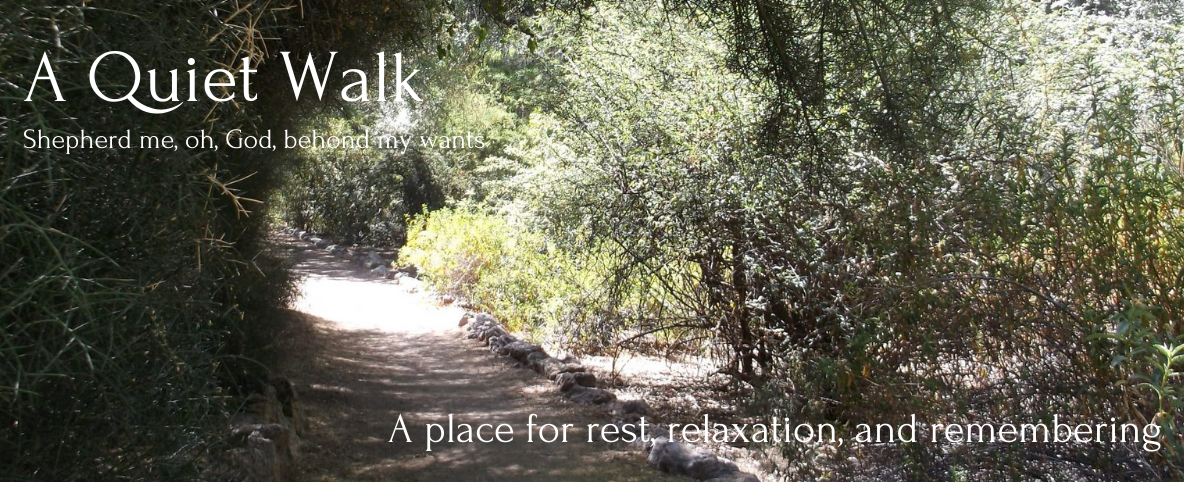
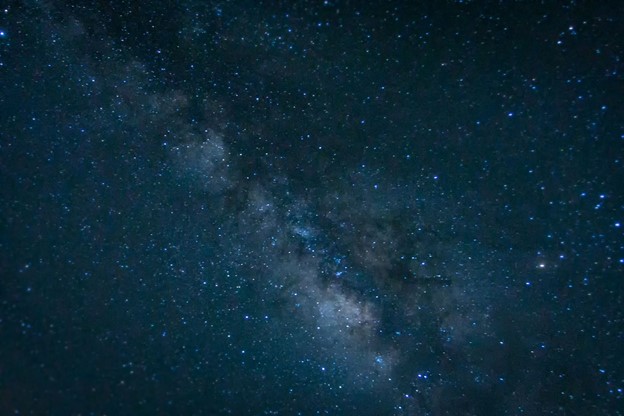
To hear my heart beat
To listen to my soul
To feel the universe
move
through
my
body
Ruth Jewell, ©March 9, 2021
Image: Microsoft Stock Image
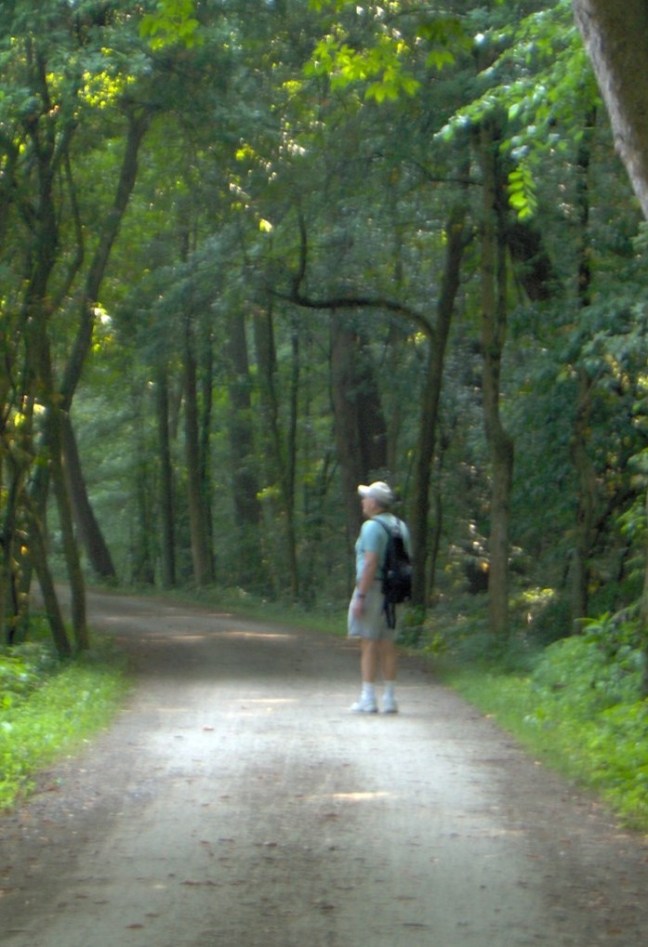
How do I put into words
A grief so deep
It scalds my heart?
How does
This soul so lonely say
I miss you?
You are my love, and
You are drifting away
Bit by bit I am losing you.
Some days you are you, and
Some days a little more
Is gone.
I want to tell you
To stay, don’t go, but
You don’t understand.
I love you,
I always will,
And I miss you.
How do I put into words
A grief so deep
It scalds my heart?
Ruth Jewell, ©May 4, 2020


Song of Solomon 5:2-8 (CEB)
2 I was sleeping, but my heart was awake.
A sound! My love is knocking:
“Open for me, my sister, my dearest,
my dove, my perfect one!
My head is soaked with dew,
my hair, with the night mists.”
3 “I have taken off my tunic—
why should I put it on again?
I have bathed my feet—
why should I get them dirty?”
4 My love put his hand in through the latch hole,
and my body ached for him.
5 I rose; I went to open for my love,
and my hands dripped myrrh,
my fingers, liquid myrrh,
over the handles of the lock.
6 I went and opened for my love,
but my love had turned, gone away.
I nearly died when he turned away.
I looked for him but couldn’t find him.
I called out to him, but he didn’t answer me.
7 They found me—the guards
who make their rounds in the city.
They struck me, bruised me.
They took my shawl away from me,
those guards of the city walls!
8 I place you under oath, daughters of Jerusalem:
If you find my love, what should you tell him?
That I’m weak with love!
I have always loved poetry. In college I had a professor who called them paintings with words. And, like a good landscape some poems are just what you see, such as Fog by Carl Sandburg:
The fog comes
on little cat feet.
It sits looking
over harbor and city
on silent haunches
and then moves on.
And then there are the Picasso like poems, you know, the ones you have to think about, they say one thing and mean another such as the opening lines of the Song of Solomon:
2 Let him kiss me with the kisses of his mouth—
for your love is more delightful than wine.
3 Pleasing is the fragrance of your perfumes;
your name is like perfume poured out.
No wonder the young women love you!
4 Take me away with you—let us hurry!
Let the king bring me into his chambers. (1:2-4)
For all intents and purposes this is nothing more than a love poem about a young couple in love. But if we look closer there is more than one meaning hidden in these beautiful words. We can read this as love poetry or we can interpret the Song of Songs as an allegory of God’s love for the Hebrew People, or Christs love for the church. I am sure if we sat down we would find another allegory that would work just as well.
The Song of Songs, as it is titled in the Hebrew bible, is one of five books called the “Five Scrolls.” They are The Song of Songs (a collection of eight poems), Ruth, Ecclesiastes, Lamentations and Esther. Of those five, the Song and Esther are the only two books in either the Hebrew or Christian canon that never mentions God, which makes them unique.
Sometime between the third and fourth century CE the Hebrew Canon was pretty much finalized. The discussion of the inclusion of the five scrolls, especially the Song of Songs, into the Hebrew Canon was fraught with controversary. The Song is after all very erotic and sensual poetry. While the poems use inuendo and metaphor instead of openly sexual language it was still not considered quite proper. It was eventually included because the Song was understood to have a more important meaning than simply love poems used for wedding ceremonies. Rabbi’s, such as the second century Rabbi Akiva, defended its inclusion saying, “while all of the sacred writings are holy, the Song of Songs is the holy of holies!”
Christians have also had a hard time accepting the Song as part of holy scripture, many considered it scandalous and not appropriate for Holy Bible. Christianity’s nearly 2000-year-old toxic attitude about sex has kept this sacred writing, that shows women in a positive light, from being studied and enjoyed for what it is. In The Forgotten Books of the Bible (2018) Robert Williamson writes “the third-century Christian theologian Origen warned . . . “that all but the most spiritually advanced people should abstain from reading the Song.” There was a fear that women who read the Song would somehow be “corrupted” and develop strange sexual longings to the detriment of the male ego. The uptight fathers of our faith simply could not accept that biblical writers could compose something as sensual and erotic as the Song of Songs! Yet Jewish tradition attributes these 8 poems to Solomon the son of David, the same David who stole Bathsheba from her husband, and the same Solomon who had 700 wives. Sexuality was Okey Dokey for biblical men, but women weren’t allowed to have the same urges. The shaming of women and blaming women for imagined male problems has been part of our culture long before St Augustine felt guilty about having sex. It is only now that we are seeing women courageously stepping up and saying no to male oppression and openly affirming they too are sexual creature’s beloved by God.
By the fifth century CE the Christian Biblical cannon was closed, which included our New Testament books and the Hebrew bible as the Old Testament. By accepting a majority of the books in the Hebrew Cannon the Christians of the 5th century was accepting the Song of Songs’ Jewish interpretation, with a minor variation. Jews interpreted the poems as God’s love for Israel and Christians as Christ’s love for the church, so not really all that different. But there is one more way to interpret the Song of Songs, and for us today, that is the interpretation I find so interesting and important. Let me describe the three ways to interpret the Song of Songs.
Of the three ways to interpret the Song of Songs, the first and foremost way is love poetry. The 8 poems celebrate young love, specifically the love between a young girl who cares for a vineyard and a young shepherd boy. The family wants to shelter their daughter, believing she isn’t ready to have a serious relationship, and, they would be wrong. Here she sings;
1 All night long on my bed
I looked for the one my heart loves;
I looked for him but did not find him.
2 I will get up now and go about the city,
through its streets and squares;
I will search for the one my heart loves.
So I looked for him but did not find him.
3 The watchmen found me
as they made their rounds in the city.
“Have you seen the one my heart loves?”
4 Scarcely had I passed them
when I found the one my heart loves.
I held him and would not let him go
till I had brought him to my mother’s house,
to the room of the one who conceived me.
Certainly not the words of an immature child. This poetry unabashedly celebrates the love between two people. There is no embarrassment or shame attached to their joy in their bodies and their total enjoyment of the pleasures of sex. The poems describe flirting, and playful language highlighting the excitement and joy the two lovers have in the presence of each other. To read the Song of Songs as paean to the sacredness of love is to remember and relish our own experience as lovers. That is what love poetry is for.
Unfortunately, the Songs of Songs has been ignored and push aside for so long that most people have never read it, and some don’t even know it is part of Holy Scripture. That is a real shame. Here is a biblical book that shows women in a favorable light, as a human who thinks, loves, celebrates, experiences grief, and loneliness just as men are depicted in scripture.
Our culture has always had a problem with sex and the church has had a role in creating that problem. Since the beginnings of the church we have had an unhealthy relationship with our bodies. This has resulted in half of humanity being told to be ashamed of who they are and the other half doing the shaming. Saint Augustin of Hippo (354-430 CE) played a huge role in how women were viewed and treated by the church. He was man consumed by guilt and one of those guilts was his guilt for having sex. His beliefs that women were the cause of mans downfall, i.e. Eve, were instrumental in the churches views on women. Having a Holy Book in the Bible celebrating the passion of young lovers’ and the enjoyment of each other signals the importance of loving and being loved.
The image of the strong female character, even though still a teenager, is an important image that empower women and girls, something our church fathers were very much against. The male church leaders were not in favor of giving up the power they had in the church to women. In this time of the “METOO” movements it is vital that positive images of biblical women be highlighted. It is time for women to claim their rightful place in God’s Kingdom, not as a second class, appendage to the male’s ego’s, but as equal partners in Gods creative universe.
The second, and third, way of looking at the Songs is with allegory. The interpretation of God/Christ, as the male character, and the people of Israel/the church as the female character is the traditional Jewish/Christian interpretation. Jewish tradition reads the Song during Passover as a reminder of God’s love by rescuing the Israelites from Egypt and the care God gave them during the Exodus. One beautiful passage describes God’s embrace of Israel, “His left arm is under my head, and his right arm embraces me.” (Song of Songs, 2:6) An intimate picture of God holding and loving humanity. Christians rarely read the Song, which is a sad commentary on our inhibitions.
At the beginning of this article I quote a passage from the song that paints another picture of God as the male lover. The lover comes late at night to the woman’s door and when she is slow to respond to his summons he walks away. When our young woman opens the door and finds him gone she runs into the street to look for him but instead is found by the guards and is abused and assaulted.
One interpretation alludes this passage to the Babylonian Exile, when God abandoned the Hebrew people. However, most Jewish, Christian, commentaries I read seemed to pass over this with a statement that acknowledges Gods inconsistency in dealing with the Hebrew people, or the Church, throughout history. But I find this passage disturbing. The idea of God simply abandoning humanity in times of suffering, pain, and crisis is abhorrent. How can a loving God do that? This leads into the Third and final, allegorical interpretation.
What if we identify God as the female lover and the male lover as the people of God? How does that change our view of the Song of Songs, of God, and of our role in our relationship with God? Reading the allegory as the female character transforms the Song of Songs. No longer is God the lover who goes gallivanting around the countryside, while the lady waits patiently for his return. God now is the one who says,
“I looked for the one my heart loves;
I looked for him but did not find him.
I will get up now and go about the city,
through its streets and squares;
I will search for the one my heart loves.” (3:1b-2a)
Now it is God who is the constant one, who waits for, and longs for the one she loves to return from wanderings and come into her arms. Humanity is the one who leaves, abandoning God. It is Humanity that turns away from the door when we believe God doesn’t answer quickly enough. It is God who risks being assaulted and beaten because she goes into the dark to find us. God’s claim on each of us is not of our doing, we are Gods because of God’s love for us. God’s love has nothing to do with faith, no, rather it is the matter of divine certainty. In a bad parody of Captain Picard, God made it so. When we read these words:
Place me like a seal over your heart,
like a seal on your arm;
for love is as strong as death,
its jealousy unyielding as the grave.
It burns like blazing fire,
like a mighty flame. (8:6)
. . . we no longer hear humanity asking God to remember us but rather we hear God’s voice giving us the assurance that God will never forget, can never forget us, even unto death.
In the end there is no right or wrong way to read the Song of Songs. Read it as love poetry and revel in the celebration of young bodies, young people in love. Read it allegorically with God as the young man who passionately loves humanity, calling us beloved. Or read with God as the female lover who claims us before we claim her. Who waits for us to finish our wandering and return to her. Who goes into the dark and risk the divine life for us.
The Song of Songs is not shameful, rather it is the celebratory expression of human sexuality, and God’s passionate love for us. There is no other book in scripture that can express in a better way the passion and intimacy of God’s love for us, our love for God, and our love for each other.
Ruth Jewell, ©October 2, 2018


Tomorrow, November 8th, is election day and I am becoming increasingly concerned about what will happen tomorrow and in the days and months that follow. This campaign has been so very divisive, hateful, and acrimonious that I fear for the safety of whoever wins and for our own. The name calling on both sides and the call to kill a candidate, the call to commit treason, and murder goes beyond anything we have seen before. We are in a difficult time where we need to step back and rethink our and way forward.
It will not be easy to heal the wounds opened in this election cycle to much hatred and anger has been spewed into our air to make this a comfortable process but we must begin to forgive each other if we are to be the people we profess to be. The spiritual practice of prayer, individual and corporate, helps us focus on each other rather our own selfish interests. Prayer can awaken our concern for the welfare of all and quiet our fears that we are threatened by forces we cannot control. Prayer gives us the courage and strength to take control of who we are as spiritual beings.
To begin I offer a prayer written by the Rev. Kara Markel, a pastor friend of mine, for the Council on Christian Unity, to begin our election day and post-election spiritual practice. As we offer our prayers may we remember Jesus cared for all of us; poor and rich, Christian and non-Christian, Male, female, and differently gendered, and peoples from all cultures and ethnicities. Let us open our hearts to reconciling with each other in prayer.
An Election Prayer
11/5/2016
Let us be a people at prayer in these days of waiting:
We pray for our president elect, that they will lead our country with strength and compassion; that they may represent the very best of the United States around the globe; that they may be committed to justice and peace, and bringing our nation together to address our challenges.
Lord, hear our prayer.
We pray for our governors and legislators, that they will be responsive to their whole constituency and enact laws that ensure the wellbeing of all the people they represent.
Lord, hear our prayer.
We pray for all others elected to public office, that their service to their people would be just and beyond reproach; that where ever they serve in local government, schools, or law enforcement, they would treat all people with dignity and serve the common good.
Lord, hear our prayer.
We pray for our nation, our cities, and our neighborhoods, that together we can create a place where all people are respected and safe, where difference of opinion does not lead to violence, and where our combined creativity heals brokenness of all kinds.
Lord, hear our prayer.
We pray also that regardless of the outcome of this Election Day, we would remember that we are called by Christ to care for our neighbor, pursue peace and work for justice in our communities. Inspire us to work together, across divisions and difference, to create beloved community where ever we can.
Lord, hear our prayer.
From the Council on Christian Unity
written by The Rev. Kara Markell, Pastor
Lake Washington Christian Church
Kirkland, Washington
Ruth Jewell, ©November 7, 2016

“Thus says the LORD of hosts, Render true judgments,
show kindness and mercy each to his brother.”
–Zechariah, 7:9
“You have heard it said love your neighbor and hate your enemy.
But I say to you, Love your enemies and pray for those who persecute you.”
–Matthew 5:43-44

Thursday I am taking part in the Face book event 24 Hours of Random Acts of Kindness. I don’t have to DO anything specific, or travel anywhere. The only thing I am asked to do is perform some act of kindness for someone who doesn’t expect it. Sounds simple, I guess I will see.
I have been trying to decide what I would do, help a little old lady across the street, well I am a little old lady so I will leave that for someone else to do. Maybe take cookies and give them a way, Now that I could do. Wait a minute; I do believe I am trying to plan for something for a random event now that can’t’ be right.
My favorite Biblical verse comes is Micah 6:8 “He has told you, O mortal, what is good; and what does the Lord require of you but to do justice, and to love kindness, and to walk humbly with your God?” Nowhere in this small verse does it say we are to plan to do any of that. Rather when we see injustice we do something to correct it. When we see the embodiment of God we are to walk together. When we see someone, be it human or otherwise, in need of kindness we are to offer it freely with no expectation of being acknowledged or of a being paid back. We are to show kindness where it is least expected, recognizing the blessedness of the recipient. Even if the freely given gift is refused or unacknowledged we have done what is right in the eyes, heart and mind of the Spirit.
Oscar Hammerstein wrote: “A bell’s not a bell ’til you ring it – A song’s not a song ’til you sing it – Love in your heart wasn’t put there to stay – Love isn’t love ’til you give it away!” To give the gift of kindness is to put your love into action. What a better way to express God’s great gift of love, the Teachings of Jesus and the Holy Spirit, than by giving it away.
So this week I am going to challenge you to practice the spiritual practice of a “Random Act of Kindness.” Sometime this week do kind act for someone or some creature when they least expect it. If you want to up this challenge a notch, try doing it anonymously and let your heart warm with the thought of the gift being received.
May your week be filled with kindness; kindness received and kindness gifted.
Ruth Jewell, ©May 17, 2016

“And the Lord was sorry that he had made humankind on the earth,
and it grieved him to his heart.” – Genesis 6:6, NRSV)

Fire Rainbow Taken Spring 2015
This past weekend I was asked by a Facebook friend to comment on the following meme from the Celtic Christian Tradition.
“The greatest single cause of atheism in the world today is Christians who acknowledge Jesus with their lips then walk out the door and deny him by their lifestyle. That is what an unbelieving world simply finds unbelievable.” (www.facebook.com/CelticChristianTradition, April 30, 2016)
My friend is not a believer in Christianity but he and I have had many an interesting online discussion on faith and beliefs. I have always found him to be an open minded and intelligent person and so I gladly responded to his request to comment.
“Well I don’t know if saying you believe in Jesus but don’t actually follow his teachings is a cause of atheism or not, but it certainly is the cause of so many to question the values of Christianity. Just saying you believe in Jesus is like saying the ‘Sun rises in the East,’ it’s a statement. Being faithful to the teachings of Jesus however means you are loyal to those teachings and practice them, or at least do you your best to try, every day. If you only use the words to carry a message of hate, domination and greed then you have become separated from God and are not longer the blessing you are meant to be.
There is Good in everything, human, animal, plant, all creation and it doesn’t matter how you see the Good. It only matters that you do. The Good is what keeps each of us rising up every morning, keeps us loving our neighbors regardless of who they are and keeps us part of the human family. To deny the Good in anyone, any creature, any part of creation is to be cut off from what makes each of us human. I listen to the hatful rhetoric spouted each day in the news and I don’t see people of faith, I see lost souls, people cut off from what is good and right in our world, and that makes me very sad.
You know I call the Good God, but that is how I see the good in the world. You see the Good in a different way, a way that gives you peace and a path to follow that is good in the world. Others see the Good in other ways, but, no matter how we explain the Good to ourselves it is all the same Good. The name may be different but it is still what is Good and Right in the world. We all have the capacity to find and see the Good, whether we are Jewish, Christian, Muslim, Hindu, Buddhist, or Atheist. The Good is still there in the world, universe, all creation and as long as some of us are able to find, see, and honor the Good in each other and creation gives me hope that we will have a world to live in.
I look for the Good in those that hat that is what my tradition tells me to do. But even if that wasn’t part of my tradition I would still look because to otherwise brings me down to the level of those who hat and I don’t want to go there. If those of us who believed in what is Good were a little more vocal we would drown out the voices of hate and all would know there are still people in this world who believe in doing good rather than speaking hate.”
After I wrote this I recognized how sad it is that there are so many who cannot, or will not see what is Good and Right in this world. Everything in creation was created good, there was nothing evil or bad about anything brought into being. Genesis 1:31a reads “God saw everything that he had made, and indeed, it was very good.” Every morning I see just how good creation is when I feel the warmth of the rising sun and hear the morning songs of birds. So in my eyes the God is still active in the world I live in. Every creature in all creation is meant to be a blessing to all of creation and to be otherwise is to separate from God and all that is good. To live outside of the love and light of God hurts God as much as it hurts those living in hate and darkness. When God’s beloved creatures did first did evil God’s heart was broken (Genesis 6:6). When we who are human do evil and practice hate instead of love and pretend it is what God wants, when we are not the blessing we are meant to be God calls out to us in pain in sorrow, “not in my Name.”
Every day the news media is filled with the words and images of people professing to be people of faith whose actions do not reflect a faith of any tradition. So many people who call themselves people of faith in one breath prove they are not in the next breath when they deny the teachings of love, compassion and justice by spouting words of hate and denying justice to those in need. Yet we who try to be followers of God, or the Good in the world, are enabling these lost souls by not speaking out against the injustice or not standing with those in need. So we are not innocent by any means.
What do we do then? We who stand for justice, mercy and compassion need to be the Isaiah’s, Micah’s, and Jeremiah’s of our day. Like the Apostles we need to be the ones who speak with love and compassion, letting those who speak hate that we know them for what they are, lost, wounded, souls and that we are sad for them and will stand with their victims. None of that is easy, and we cannot expect to change everyone overnight, but, being who we are, blessings to the world, changes the world a little bit at a time. Kindness and compassion never goes unrewarded and even in the darkest moment the single candle we light shines brighter than then darkness around it.
Ruth Jewell, ©May 2, 2016

Be generous: invest in acts of charity.
Don’t hoard your goods; spread them around.
Be a blessing to others. This could be your last night.
— Ecclesiastes 11:1a, 2, The Message
 My Mother 1988
My Mother 1988
Steven F Austin St. Park, TX
©Ruth Jewell, 2016
A recent meditation had the following journal question “If you knew you were dying what would you write or say to your children or grandchildren?” That question stopped me cold. What would I say to grandson and granddaughter, Liam and Amelia? How would I describe my love, and fears, for them? How would I tell them of my life lived with my own loves, fears, and regrets? What would I say, what would you say?
During this Easter season I have been writing about the ways we express our feelings of the resurrection, and the many ways we witness to others our faith in the resurrection. Sharing ourselves with the next generation is also a witness to our beliefs in the resurrection. The question above is an important one, challenging us to inspect our past and present lives and how that information could impact the lives that follow us. I thought long and hard about what I would, will, say to my grandchildren and all of it wasn’t bright flowers and sunshine.
What might say, well I would of course tell them I love them very much, how grateful I am for having them in my life, and I will miss them. I would ask for their forgiveness in my part for leaving them a world that is wounded and in pain, and a political system that doesn’t function. I would tell them that no matter what they do in life their parents and I would always love them from wherever we are. While their future is impacted by the world I leave behind it is still their future to make into what ever dream they reach for. Following those dreams may not be easy, or always fun, but are worth the effort if they truly believe in them. I would also tell them it is OK that they don’t believe in the Divine as I do, but, discovering their own pathway to something greater than themselves is important in finding their moral, loving, compassionate lives. I would want them to stand up against injustice even when it is hard to do so, to see the good in people and all creation even when the night is darkest. I want them to climb their most difficult mountains and to not be afraid of the challenges because I will be right there beside them cheering them on. I want my grandchildren to be fearless in the face adversity, to be strong when everyone else is weak, and to be gentle when touched by beauty.
What I want most for my beloved Liam and Amelia is to live a life that is not self-centered but other-centered. I want them to live a life that sees the best in the worst, the beauty in the ugly, and love in what is hatred. I can’t leave them with much but when I make my final passage from this world to the next I want them to know I cared about them, and want them to be the best at whatever they want to be.
So that is some of what I would tell my grandchildren, what would be in your letter to your children? We live in and uncertain world and we never know when our last day in this world will arrive. We all too often leave too much unsaid to those we love the most. So my journal question to you this week is: “If you knew you were dying what would you write or say to your children or grandchildren?”
May you find the words in your heart for those you leave behind.
Ruth Jewell, ©April 26, 2016

“And of His Signs is that He created mates for you from yourselves
that you might find peace of mind in them,
and He put between you love and compassion
al-Qur’an 30.21

With one silent laugh
You tilted the night
And the garden ran with stars.
– Jalal-ud-Din Rumi
To love someone, especially someone who doesn’t expect you to love them, may be the most important of the spiritual practices. Love is a grace of God given freely to all and as Oscar Hammerstein wrote “Love in your heart isn’t put there to stay. Love isn’t love till you give it away.” God put love in our hearts to be shared with all creation, not just humanity but animals, flowers, and yes, even rocks. To truly love is as close as we get to being the image of God.
This week share your love with a family member, a friend, an adversary, an enemy. Let the love in your heart out and be God’s image in the world.
Ruth Jewell, ©April 12, 2016
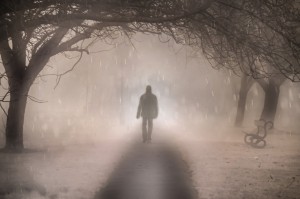
23He took the blind man by the hand and led him out of the village; and when he had put saliva on his eyes and laid his hands on him, he asked him, “Can you see anything?” 24And the man looked up and said, “I can see people, but they look like trees, walking.” 25Then Jesus laid his hands on his eyes again; and he looked intently and his sight was restored, and he saw everything clearly. – Mark 8:23-25

Publicdomain.net
In January I had Cataract surgery and I must admit I never knew how much I was missing or how dark my world had become. One of the first things I noticed was that our light bulbs were a lot brighter and we didn’t need to change them after all. I also noticed evergreen trees, grass and the leaf buds on our Lilacs were so much greener than they were. The colors of the crocus and daffodils seemed to pop out like neon lights and I was amazed at how blue the sky was (that is when we had blue sky). The funniest thing was my IPad mini. I have a screen saver of stars and low and behold I just discovered there were also clouds in the picture. I couldn’t see them before.
I thought about the scriptures where Jesus healed those who were blind, especially the one where it took two tries before the man could see clearly. In many ways we are all like that one man. We see but we don’t really ‘see.’
My sudden clarity in sight has also made me think of all the things we miss because we don’t “see” them, really see them. We see the homeless man standing on the corner but we don’t really see him. We don’t see his pain, or his embarrassment, or his fear. What we see is a figure, as the blind man said as a walking tree, but we don’t see the human, the child of God who is before us. How many of you have taken the hand of a homeless person and looked into their eyes and saw the person for who they are, our brother or sister in God.
How many of you have gone to a jail and comforted the mother of a victim, or taken the hand of a felon and said you are loved by God, don’t be afraid. How many of you have seen children arrested for stealing drugs at their parent’s request or for stealing to provide for their family’s who are held in Juvenile Detention for a year or more because there parent or guardian can’t get clean from drugs or alcohol and there is no responsible adult to care for them. How many of you have held someone suffering from mental illness or PTSD and said ‘I’m here, you aren’t alone.’
If you haven’t volunteered at a shelter or soup kitchen yet find the time to do so. Volunteering there is a lesson in compassion and humility, of seeing people society throws away as our brothers, sisters, and friends who are in pain and afraid.
I am grateful that I am now able to see creation more clearly, the colors in sunrises and sunsets, and to rediscover the beauty of spring flowers. I love it that I can now see the faces of my friends and family, each and every one of them, more clearly. I love it that much that had been hidden by my own dark glass has been made clear. But today there is so much darkness, so much fear, so much hatred that clarity of sight is difficult for us all. Jesus said “I Am the Light of the world.” (John 9:5b) and in the words of the Prophet Mohammad “God is the Light of the heavens and the earth.” (Quran 23.35a) As people of faith we are to be the light that brings sight to the blind. We are called to bring the light of love, compassion, justice, and peace to a wounded world.
My recommended Spiritual Practice for this week is to open your eyes and SEE the world around you. Take the time to gaze at the beauty of a flower, and marvel at the rebirth of delicate green leaves on a tree. Let the beauty of creation refresh your heart and cleanse your eyes. Then take the time to see the people around you, offer a sandwich to the homeless man, woman, or teenager on the corner and take the time to look into their eyes and see your brother or sister, your son or daughter. Let them know they are known for whom they are a child of God.
Gracious Lord, you gave us eyes to see you in the face of all who surround us, to see you in a smiling baby’s face, the wrinkled face of an elderly, in the broken lives of the homeless and the hungry. In our rush of our daily living we become blind to all the love you have given us and we forget to pass on the love we are given to those in need. Help us in our blindness Lord. Amen
Ruth Jewell, ©March 8, 2016

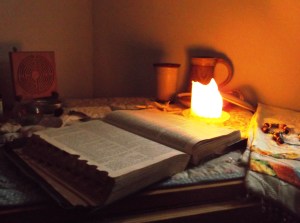
God in your mercy,
hear our prayers
The only gift I have to offer this week is my sorrow for Paris, Beirut, Syria, Iraq, and all of us. So I offer the Psalms I go to when I am in the midst of sorrow and pain. May your hearts be comforted by the words of the psalmist and may you find solace knowing others cry with you.
Psalm 36:1-4 (MSG)
A David Psalm
1-4 The God-rebel tunes in to sedition—
all ears, eager to sin.
He has no regard for God,
he stands insolent before him.
He has smooth-talked himself
into believing
That his evil
will never be noticed.
Words gutter from his mouth,
dishwater dirty.
Can’t remember when he
did anything decent.
Every time he goes to bed,
he fathers another evil plot.
When he’s loose on the streets,
nobody’s safe.
He plays with fire
and doesn’t care who gets burned.
Psalm 42 (NRSV)
1As a deer longs for flowing streams,
so my soul longs for you, O God.
2My soul thirsts for God, for the living God.
When shall I come and behold the face of God?
3My tears have been my food day and night,
while people say to me continually,
“Where is your God?”
4These things I remember, as I pour out my soul:
how I went with the throng, and led them in procession
to the house of God, with glad shouts and songs of thanksgiving,
a multitude keeping festival.
5Why are you cast down, O my soul,
and why are you disquieted within me?
Hope in God; for I shall again praise him, my help
6and my God. My soul is cast down within me;
therefore I remember you from the land of Jordan
and of Hermon, from Mount Mizar.
7Deep calls to deep at the thunder of your cataracts;
all your waves and your billows have gone over me.
8By day the Lord commands his steadfast love,
and at night his song is with me, a prayer to the God of my life.
9I say to God, my rock, “Why have you forgotten me?
Why must I walk about mournfully
because the enemy oppresses me?”
10As with a deadly wound in my body,
my adversaries taunt me,
while they say to me continually, “Where is your God?”
11Why are you cast down, O my soul,
and why are you disquieted within me?
Hope in God; for I shall again praise him,
my help and my God.
Ruth Jewell, ©November 17, 2015